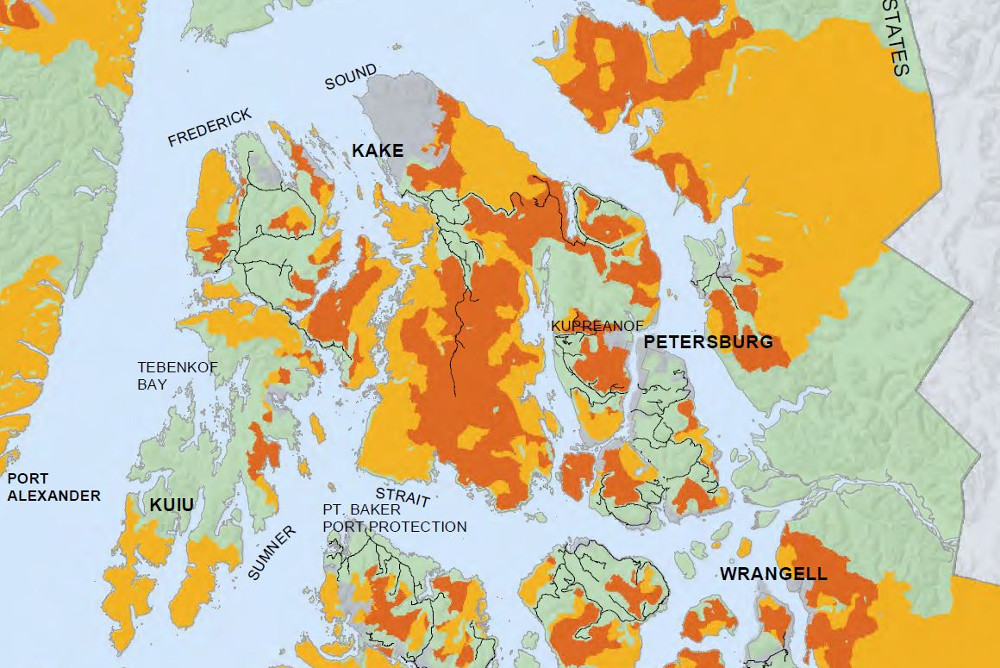
U.S. Forest Service officials last week defended the federal government’s proposal to exempt the Tongass National Forest from the Roadless Rule. That was in the face of another skeptical crowd, this time in Petersburg.
About three dozen people showed up for an informational meeting and subsistence hearing. A lot of people had questions. Many were vocal critics of the Forest Service and the process itself.
“As much as truth matters anymore I think it has to be said that this whole thing is just a sham and 100 percent corrupt,” said Malena Marvin, who direct markets her husband’s commercial fishing catch in Petersburg.
“You hear what people what actually think yet you’re trying to do something that’s coming from somewhere else,” she said. “It just doesn’t square with us on the ground, it just doesn’t square, and we oppose it. ”
Marvin and many others pushed for the no action alternative, which would make no changes to the Clinton era roadless rule’s protection of 9.2 million acres of the Tongass. Forest Service officials acknowledge that the bulk of 144,000 public comments echo that sentiment.
“It is a sacred place,” said Martha Smith, another local resident. “The world grew what it has before men were ever involved. We do not need to manage nature. We need to leave nature alone.”
Officials with the federal agency point out an exemption from the nationwide rule is a request from the state of Alaska, dates back through both democratic and republican administrations in Juneau. The agency announced its push for an Alaska specific roadless rule shortly after Agriculture secretary Sonny Perdue visited a Prince of Wales sawmill in 2018. Forest Service officials say this preferred alternative for a full exemption comes from him. Many commenting expressed frustration that their comments aren’t being heard.
Regional forester Dave Schmid tried multiple times to address that concern.
“I think this process, and like I said before, I wouldn’t be here if I didn’t believe in the process that people and you all can effect change,” Schmid said.
Some people in the crowd questioned the economic benefits that would come from a rollback. They also wanted to know what development projects haven’t happened with the roadless protection in place. With the rule in place, a number of exemptions have been granted for roads or mining development, which are often an argument used to support a rollback. Schmid acknowledged they haven’t rejected any that make it to the proposal stage.
“We’ve approved I think pretty much every exemption that has come in,” Schmid said. “What we hear, what you might hear, is that there are other projects that never get that far, is what we’ve been told, is that there are other challenges they see along the way.”
Others faulted the agency’s lack of analysis on climate change and how roadless logging would contribute to the problem.
The response from the agency was that it’s a wash, since the amount of logging isn’t projected to increase in any of the six alternatives under review. Ken Tu, who leads the agency’s team drafting the proposal, says timber harvests are set according to a 2016 plan. Even if the roadless rule went away…
“We’d still just cut up to that level,” Tu said. “Then in addition, the young growth transition strategy would remain in place.”
Logging levels could change later with revisions to the management plan for the Tongass. And the agency has already started to make some changes to that plan, proposing to relax logging restrictions on karst land and to relax scenery standards for logging planned near Petersburg.
With no difference in the amount of timber cut, the agency’s analysis says the Alaska roadless rule also promises no boost in logging jobs between any of the alternatives.
The Forest Service’s draft environmental impact statement says exempting the Tongass from roadless isn’t expected to result in more logging jobs and won’t necessarily mean more mining activity or energy development.
“Based on the 2016 Forest Plan EIS assessment, all of the alternatives would support an estimated 92 jobs in logging, 49 to 100 jobs in sawmilling and 29 to 46 jobs related to transportation and other services, with direct income ranging from $9.8 million and $10.4 million.” – draft roadless EIS, page 3-49.
The draft environmental review does anticipate greater flexibility for future timber sale areas which could possibly give the agency the ability to offer sales that are more cost effective for logging companies to harvest.
Everett Kissinger operates a saw mill in Petersburg. He asked the regional forester whether it could potentially open up more areas for logging.
“So what we’re really talking about on the roadless thing, exemption or no exemption is where this can occur?” Kissinger asked.
“Yes,” Schmid responded.
“It isn’t going change what occurs, it’s just going to change where it may occur?” Kissinger asked.
“Yes,” Schmid answered.
Another voice for logging came from Jim Martinsen who’s worked in the timber industry. He applauded the Forest Service’s efforts.
“I think we need to find a common ground that we as a region can survive and not deplete our resources,” Martinsen said. “Tongass is a national forest, it’s not a national park. It’s multi-use and it’s your guys’ responsibility to treat it that way and give the loggers some trees to cut, give the miners some stuff to do.”
The Forest Service is continuing to hold public meetings across Southeast Alaska. Agency visits to Kake and Gustavus have been canceled due to weather but may be rescheduled. Public comments are being accepted through December 17. A final decision could be out sometime next year.









